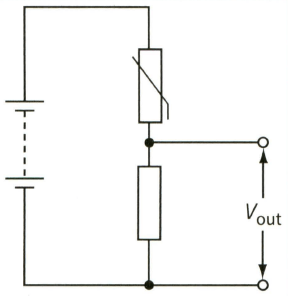To make a potentiometer, a driver cell of e.m.f. is connected across a length of resistance wire.
(a) What is the potential difference across each length of the wire? What length of wire has a p.d. of across it?

Important Questions on Practical Circuits
To make a potentiometer, a driver cell of e.m.f. is connected across a length of resistance wire.
(b) A cell of unknown e.m.f. is connected to the potentiometer and the balance point is found at a distance of from the end of the wire to which the galvanometer is connected. Estimate the value of . Explain why this can only be an estimate.
To make a potentiometer, a driver cell of e.m.f. is connected across a length of resistance wire.
(c) A standard cell of e.m.f. gives a balance length of Use this value to obtain a more accurate value for .
A resistor of resistance and a second resistor of resistance are connected in parallel across a battery of e.m.f. and internal resistance . What is the current in the battery?
(A)
(B)
(C)
(D)
This diagram shows a potential divider.

What happens when the temperature decreases?
(A) The resistance of the thermistor decreases and decreases.
(B) The resistance of the thermistor decreases and increases.
(C) The resistance of the thermistor increases and decreases.
(D) The resistance of the thermistor increases and increases.
A single cell of e.m.f. is connected across a $0.30 \Omega$ resistor. The current in the circuit is .
Calculate the terminal p.d. and explain why it is not equal to the e.m.f. of the cell.
A single cell of e.m.f. is connected across a $0.30 \Omega$ resistor. The current in the circuit is .
(b) Show that the internal resistance of the cell is .
A single cell of e.m.f. is connected across a $0.30 \Omega$ resistor. The current in the circuit is .
(c) It is suggested that the power dissipated in the external resistor is a maximum when its resistance is equal to the internal resistance of the cell.
(i) Calculate the power dissipated when .
A single cell of e.m.f. is connected across a $0.30 \Omega$ resistor. The current in the circuit is .
(c) It is suggested that the power dissipated in the external resistor is a maximum when its resistance is equal to the internal resistance of the cell.
(ii) Show that the power dissipated when and is less than that dissipated when , as the statement suggests.
